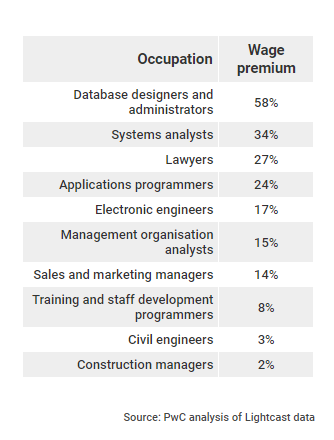Employers pay 14% wage premium for AI skills
UK employers are willing to pay a 14% wage premium for workers with AI skills, according to research that finds demand for tech skills and productivity in the most AI-exposed sectors has soared.
Growth in job vacancies demanding artificial intelligence-related skills such as machine learning capabilities has outpaced growth seen across all other jobs since 2016, according to PwC's 2024 Global AI Jobs Barometer.
This has meant employers are willing to pay a premium to entice workers with these skills. On average, they expect to pay a 14% wage premium for jobs requiring AI skills, but this increases to 58% for database designers and administrators with AI skills, and 27% for lawyers.
Between 2012 and 2023, postings for AI jobs in the UK grew 3.6 times faster than for all other roles, growing from three in one thousand in 2012 to nine in one thousand in 2023.
However, growth in AI jobs in the UK remains low compared to other countries. In Singapore, demand for jobs that require AI skills has grown 13.5 times faster than all jobs across the same period.

Globally, the sectors most exposed to AI, where the technology can readily be used for some tasks, have seen 4.8 times greater productivity growth than those less able to adopt AI.
In the UK, the uptick in productivity in these sectors, such as financial services, information technology, and professional services, is marginally above the global average.
Mehdi Sahneh, senior economist at PwC UK, said AI could potentially "turn the dial" on the UK's languishing productivity.
"Since the financial crisis, UK productivity has trailed that of all of the G7 nations, bar Japan, growing only 2.2% on average between 2008 and 2021. With the gap widening in recent years, AI could be the missing piece of the UK's productivity puzzle, bringing a boost to the economy, wages, and living standards," said Sahneh.
The report also finds that demand for other skills in the sectors most exposed to AI could lessen, highlighting the need for employees to adapt and build new skills. The rate of job growth was 27% lower in AI-exposed occupations, although the number of jobs is still growing overall.
PwC's recent CEO survey found that 64% of UK CEOs said that AI will require most of their workforce to develop new skills in the next three years.
"In terms of the economic impact, we are only seeing the tip of the iceberg - currently our findings suggest that the adoption of AI is concentrated in a few sectors of the economy, but once the technology improves and diffuses across other sectors of the economy, the future potential could be transformative," said Barret Kupelian, chief economist at PwC UK.
"Historically big leaps in technology presage changes in the labour market. We are already seeing this happen. Our analysis suggests that the menu of skills required by employers in occupations exposed to AI is changing about 25% faster than those which aren't. As pickup of AI continues, this trend is likely to intensify, creating new roles whilst also reducing demand for some skills that can be done more efficiently using AI."
The report also found that
- Skills sought by employers are changing at a 25% higher rate in occupations most exposed to AI.
- Demand for skills that AI can assist with, such as coding in Javascript, is declining quickly, while demand for skills that complement AI or are hard for AI to do, such as sports coaching or ecological restoration, is increasing.
- The information and communication sector has been the largest seeker of AI-related jobs since 2012, followed by education and professional services.
